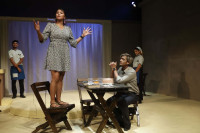Culture & Lifestyle
Kalinga Literary Festival concludes
The event featured more than 50 sessions focused on topics as diverse as cinema, literature, and diplomacy.
Post Report
The third edition of the Kathmandu Kalinga Literary Festival concluded at Hotel Himalaya in Lalitpur. The two-day event had over 50 sessions and ended on a note that the fourth edition will be held from September 13 to 14, 2025.
In one of the sessions, titled ‘Life Dedicated to Nepalese Films’, actor Rajesh Hamal conversed with Rupesh Shrestha. Hamal addressed the current state of the Nepali film industry, dismissing the notion that it is stuck in a rut. He emphasised that while the industry faces challenges, it is progressing. Reflecting on his career, Hamal noted the industry's significant expansion since his early days.
In a session titled ‘Nepal: The Gateway to Asian Art, Culture, and Literature’, panellists Abhi Subedi, Uday Prakash, and Rohini Rana, with Chandra Dev Bhatta as the moderator, explored Nepal's rich cultural heritage. Subedi highlighted Nepal’s architectural achievements since the Lichchhavi period, emphasising the influence of faith and religion on ancient structures. On the other hand, Rana stressed the importance of food as an integral part of art and culture.
Former Indian ambassador to Nepal, Ranjit Rae, spoke in a session titled ‘Rethinking Development and Diplomacy in the Digital Age’. He emphasised the importance of credibility in diplomacy and noted that people are central to influencing government decisions, pointing to recent events in Bangladesh and the 2006 people’s movement in Nepal.
In the ‘The Art of Storytelling in Film’ session, director Sujit Bidari shared his insights on the creative process behind his acclaimed film Ainaa Jhyal Ko Putali. Bidari emphasised the importance of consuming diverse content to inspire creativity and advised aspiring filmmakers to revise their work repeatedly to maintain objectivity. He noted that detachment from one's work allows for a fresh perspective, essential for storytelling.
Another session, ‘Voices of Tomorrow: Emerging Literary Talents of South Asia’, featured panellists Badri Narayan, Ranjan Adiga, Sumit Sharma Sameer, and Mahendra P Joshi. Addressing misconceptions about younger generations, Adiga dispelled the myth that Gen Z is not engaged with literature. He argued that social media and Netflix platforms have enhanced their engagement with art and culture. The panellists also discussed the importance of creating exceptional works to capture the attention of today’s discerning audiences.
Narayan said that writers remain important and credible even as education and social issues change. Joshi pointed out that marketing is critical to attracting younger readers. He explained that writers need to understand the preferences of the new generation.
On the second and final day of the festival, around 30 sessions took place. These included topics such as ‘Diaspora and The Craft of Writing and Literature,’ ‘Mythilak Nari in Cultural Communication,’ ‘Charting the Future of Civilizational Dialogue,’ ‘Child Psychology in Children's Literature,’ ‘Gorkha Identity: Opportunities and Challenges,’ ‘Beauty with Brains and Social Responsibility,’ ‘Gajapati: The King without a Kingdom,’ and ‘How Does Literature Empower Women,’ among others.




 27.22°C Kathmandu
27.22°C Kathmandu














